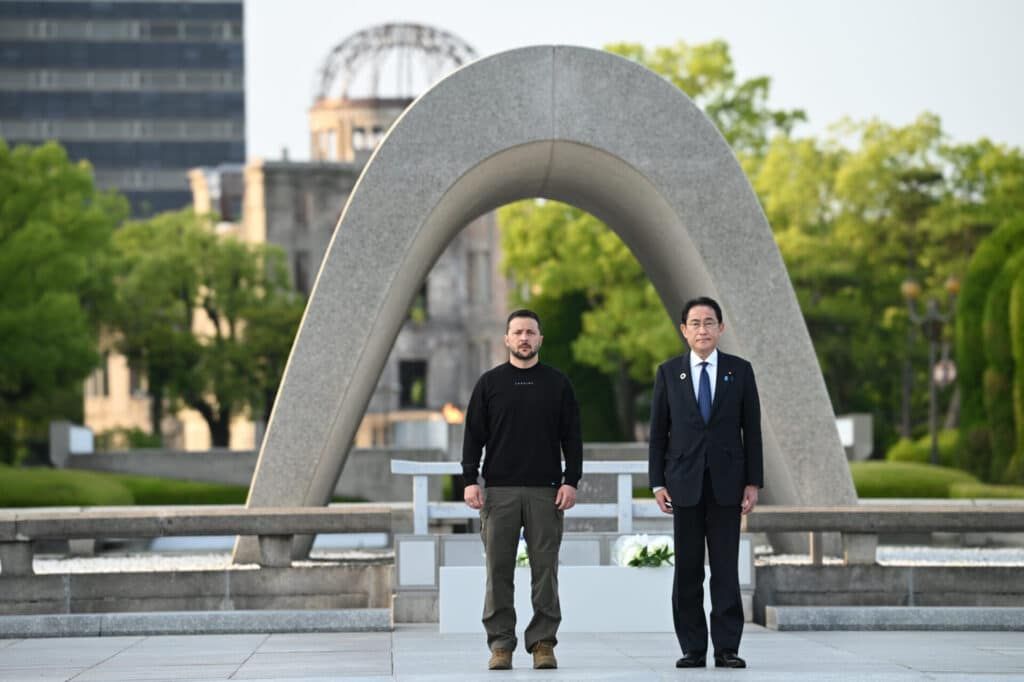In Hiroshima, the G7 economies leverage global security gains
By Marina Lorenzini | May 22, 2023
 Ukraine's President Volodomyr Zelensky and Japan’s Prime Minister Fumio Kishida paid tribute to the victims of the atomic bombings at the Hiroshima Peace Memorial Park on May 21, 2023. Zelensky attended several sessions on the last day of the G7 Summit in Hiroshima City, Japan. (Photo courtesy of the Ministry of Foreign Affairs of Japan)
Ukraine's President Volodomyr Zelensky and Japan’s Prime Minister Fumio Kishida paid tribute to the victims of the atomic bombings at the Hiroshima Peace Memorial Park on May 21, 2023. Zelensky attended several sessions on the last day of the G7 Summit in Hiroshima City, Japan. (Photo courtesy of the Ministry of Foreign Affairs of Japan)
This year’s heads of state meeting for the Group of Seven (G7) summit in Hiroshima, Japan demonstrated the agility of this body. The G7 leaders represent the powerhouse industrial democracies who are pulling their resources to maintain global economic stability and prosperity—and, this time, global security. In the course of 72 hours, Japan’s Prime Minister Fumio Kishida and the invited delegations took significant steps on some of the most pressing issues facing the world—from delivering F-16 aircraft to Ukraine to bolstering relations between Seoul and Tokyo and countering China’s economic coercion.
In mid-April, academics from six continents and policy-makers from Japan, including the Hiroshima Prefecture and Governor Hidehiko Yuzaki, gathered for a conference in Hiroshima ahead of the G7 summit. During the conference—which was convened by the MacArthur Foundation-funded Research Network on Rethinking Nuclear Deterrence housed under Harvard University’s Project on Managing the Atom—participants discussed issues such as the merits of nuclear deterrence, risk reduction instruments, and alternative security arrangements.
Notably, the readouts and final G7 leaders’ communiqué in Hiroshima takes some bold stances on nuclear weapons issues. Kishida clearly used the setting well to bring abstract threats into tangible action steps for all attendees.
Increased emphasis on security issues. Throughout April and May, Japan hosted ministerial-level meetings on the typical G7 economic topics, such as energy, employment, finance, and technology. However, Kishida’s decision to host the summit in Hiroshima rather than Tokyo or Osaka—two of the main economic metropoles of Japan—sent a clear signal to domestic and international audiences that Tokyo’s commitment to a world without nuclear threats is a priority for his administration.
In the very first few lines of the joint communiqué, the G7 leaders committed to taking concrete steps to “strengthen disarmament and non-proliferation efforts, towards the ultimate goal of a world without nuclear weapons with undiminished security for all.” This statement follows one from Kishida earlier this year, when he told French President Emmanuel Macron that the G7 leaders must “demonstrate a firm commitment to absolutely reject the threat or use of nuclear weapons.” However, this would be a bold and unprecedented stance for the nuclear weapons possessing states (France, the United Kingdom, and the United States) to declare on the global stage.
Aside from the setting of Hiroshima, the war in Ukraine was clearly high on the agenda last week. Ukrainian President Volodymyr Zelensky capped the gathering with strong appeals for unity, asking for more military aid and sanctions against the Russian belligerents. Thus far, the G7 leaders have pledged to restrict any exports to Russia that could help it in its 15-month-old invasion of Ukraine. On the first day of the summit, on Friday, May 19, the United States alone announced 300 new designations on Russia.
Unsurprisingly, the headlines of the war in Ukraine were integrated into the statements concerning weapons of mass destruction. Ahead of the summit, the G7 Non-Proliferation Directors Group issued a statement that outlined several agenda items of concern. Those concerns included Russia’s suspension of New START (the only nuclear arms control agreement remaining between Russia and the United States), risks emerging from the situation at the Zaporizhzhia nuclear power plant in southeastern Ukraine, and potential deployment of Russian nuclear weapons in Belarus. If New START collapses or expires in 2026 without a replacement, the state leaders seem aware that this could trigger a destabilizing security environment in multiple geographic areas and military domains.
The G7 also issued the “Hiroshima Vision on Nuclear Disarmament.” The statement built upon the Non-Proliferation Group statement in many ways, including support for the Treaty on the Non-Proliferation of Nuclear Weapons (NPT), halting North Korea’s ballistic missile launches, and diplomatic steps to constrain Iran’s advancing nuclear program. It went further to identify other areas to support disarmament efforts, such as a serious dialogue between nuclear weapons states and non-nuclear weapons states, pre-notification of strategic activities, negotiations on the Fissile Material Cutoff Treaty, and bringing into force the Comprehensive Nuclear-Test-Ban Treaty.
In the absence of coherence at the UN security council—to which Russia is a permanent member—the G7 may become the only cohesive international body of sufficient momentum to create enough incentives for countries to come to the table and negotiate a serious path toward nuclear arms control and disarmament.
Expanding the diplomatic table. This year, the six Western countries were represented at the G7 summit by Canadian Prime Minister Justin Trudeau, French President Emmanuel Macron, German Chancellor Olaf Scholz, Italian Prime Minister Giorgia Meloni, UK Prime Minister Rishi Sunak, and US President Joe Biden. As has become common practice, the presidents of the European Commission and of the European Council—Ursula von der Leyen and Charles Michel, respectively—were also invited.
For this year’s summit, Japan’s Prime Minister Kishida brought into the conversation several other heavyweights across Asia, including Australia’s Prime Minister Anthony Albanese, India’s Prime Minister Narendra Modi, South Korea’s president Yoon Suk-yeol, as well as the leaders of the Cook Islands (representing the Pacific Forum of Nations), Indonesia, and Vietnam joined as observer states. Comoros (representing the African Union) and Brazil’s President Lula da Silva were also observers. In doing so, Kishida recognized that integration distributes the risk, and even responsibility, of current and potential shocks across several parties.
The diverse pool of guests also offered an opportunity for the non-nuclear weapons states and the nuclear weapons possessors to have a platform for conversation among peers. State delegations were in the same room, rather than relying on engagements on the margins of formal sessions. The G7 is a unique body, especially with Japan as a host, in its ability to bridge the divide between “Western” nations and the Global South. Perhaps, this year’s summit will act to jump start one of the key recommendations in the Hiroshima Vision for Nuclear Disarmament.
Despite Japan being the only Asian member country, the G7 as a body has the agility and relevance to bend to different regions and topics. Kishida’s chair further solidified the G7 as a critical body for the trade relationships intersecting with the region. The invitation to the South Korean delegation is also a milestone as Kishida seeks strong ties with counterparts in Seoul. (Remarkably, President Yoon Suk Yeol delivered a talk at Harvard’s Kennedy School during our conference in Hiroshima). In the economic realm, Japan has a track record of brokering some major trade agreements, such as the Comprehensive and Progressive Trans-Pacific Partnership and the Regional Comprehensive Economic Partnership, a peer competitor to China on infrastructure finance.
The principal outcome of this meeting on the trade portfolio was addressed toward China: The final communiqué asserts that the G7 countries “are not decoupling or turning inwards” and that “economic resilience requires de-risking and diversifying. [They] will take steps, individually and collectively, to invest in [their] own economic vibrancy. [They] will reduce excessive dependencies in [their] critical supply chains.” UK’s Sunak and India’s Modi reviewed the progress of the ongoing free trade agreement between their two countries.
Via “the Quad,” which met on the sidelines of the G7 summit, Japan demonstrated its leadership among maritime democracies. (The Quad include leaders of Australia, India, Japan, and the United States.) Ahead of the meeting, White House press secretary Karine Jean-Pierre, shared that the Quad leaders would discuss “secure digital technology, submarine cables, infrastructure capacity building, and maritime domain awareness.” The meeting readout identified the five main discussion points as: commitment to a free and open Indo-Pacific, the use of force or coercion in the Indo-Pacific, North Korea’s nuclear and missile activities as well as Japanese abductees, Russia’s use or threat of nuclear weapons use in Ukraine, and developing cooperation across Pacific countries.
The G7 summit also acted as a vehicle to cement Japan’s ties with Europe and the United Kingdom. Ahead of the summit, Sunak and Kishida signed an agreement focused on the two nations’ armed forces and a new partnership to protect chip supply chains, dubbed “The Hiroshima Accord.” Japan is also working with defense ministers from Italy and the United Kingdom on the joint development of a next-generation fighter jet in the face of growing threat from China, Russia, and North Korea. Japan is also set to open a liaison office at NATO in response to the war in Ukraine.
Kishida leveraged the G7 leaders to do what a geographic-based military alliance cannot—a dexterity to address geopolitical challenges bolstered by products and services that lead global markets.
Will the G7 leaders turn their communiqué into practice?
Together, we make the world safer.
The Bulletin elevates expert voices above the noise. But as an independent nonprofit organization, our operations depend on the support of readers like you. Help us continue to deliver quality journalism that holds leaders accountable. Your support of our work at any level is important. In return, we promise our coverage will be understandable, influential, vigilant, solution-oriented, and fair-minded. Together we can make a difference.
Keywords: G7, Hiroshima, Japan, nuclear arms control
Topics: Nuclear Weapons















